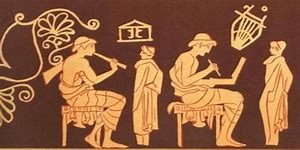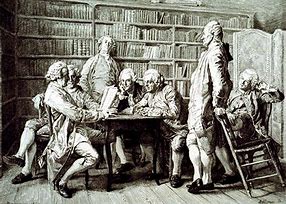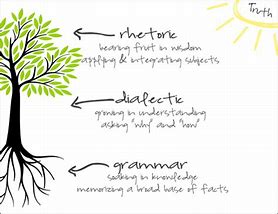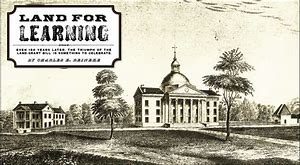Education Defined
The essence of education is dispelling ignorance, acquainting a learner with reality. However, because the nature of reality is a religious question, education can not help being driven by a particular worldview. Education (distinguished from training) is discipleship in a view of God, the world, and one self.
God has established the  educational process as the human mechanism for perpetuating and advancing life on earth. Each generation stands on the shoulders of the previous generations in developing an understanding of reality and of the universe in which they live. Few educations will get everything wrong about the world -if it were so, it would prove faulty in one generation and be abandoned. However, the system can be more or less erroneous, and its errors can be more or less severe.
educational process as the human mechanism for perpetuating and advancing life on earth. Each generation stands on the shoulders of the previous generations in developing an understanding of reality and of the universe in which they live. Few educations will get everything wrong about the world -if it were so, it would prove faulty in one generation and be abandoned. However, the system can be more or less erroneous, and its errors can be more or less severe.
Historical Influences that Shape Education
Humans have participated in education from the very beginnings of human life. Moses told the Israelites to “teach [the Word of God] diligently unto thy children, and shalt talk of them when thou sittest in thine house, and when thou walkest by the way, and when thou liest down, and when thou risest up” (Deuteronomy 6:7). The Jews have always valued education.
The Greeks and the Romans had highly developed educational systems that focused on language, arithmetic, geometry, astronomy and music. The Greek child went to school at the age of seven if his parents could afford to pay the fees. He studied basic skills (reading, writing, counting), music  (poetry, dance, musical instrument), and physical skills (wrestling, boxing, running, throwing the javelin and discus; see 1 Corinthians 9:24–27). At sixteen, he went on to the gymnasium to study literature, philosophy, and politics. The Romans employed a similar system for the education of their youth.
(poetry, dance, musical instrument), and physical skills (wrestling, boxing, running, throwing the javelin and discus; see 1 Corinthians 9:24–27). At sixteen, he went on to the gymnasium to study literature, philosophy, and politics. The Romans employed a similar system for the education of their youth.
For centuries after Christianity became dominant in the West, education was centered around churches and monasteries. Most Westerners—common folk and scholars alike—thought within the framework of a biblical worldview. They assumed that God had created the world, that humans were created in God’s image, that human reason could apprehend truth because God had given them this capacity, that biblical morality was universally true and unchanging, and that the Bible accurately described human nature and the solutions to human problems.
The founding of the University of Bologna in AD 1158 is generally recognized as the beginning of modern university-level education. Until the Enlightenment of the eighteenth-century , virtually all education in the west reflected a Christian worldview. The achievements of the Reformation, Renaissance and Enlightenment all germinated within the soil of a broad Christian consensus. The entire scientific endeavor is rooted in the idea that the universe is understandable because God is the Creator.
, virtually all education in the west reflected a Christian worldview. The achievements of the Reformation, Renaissance and Enlightenment all germinated within the soil of a broad Christian consensus. The entire scientific endeavor is rooted in the idea that the universe is understandable because God is the Creator.
Classical education as understood and taught in the middle ages of Western culture is roughly based on the ancient Greek concept of Paideia (child training). The classical model is a time-proven method employing a three-phase model (called the Trivium) that corresponds to the natural stages in child development. This model for centuries has produced extraordinary men and women of achievement and thought.
- In the early years (5-11), the child enjoys learning knowledge – the grammar stage. Memory work and repetition are what the children enjoy doing at this stage.
 Contrary to accepted wisdom in secular education, there is nothing useless or inferior about ‘rote learning’. Children of this age thrive on that. Here children are grounded in the basic components of the whatever field of knowledge they are learning.
Contrary to accepted wisdom in secular education, there is nothing useless or inferior about ‘rote learning’. Children of this age thrive on that. Here children are grounded in the basic components of the whatever field of knowledge they are learning. - In the middle years (12-14), the child enjoys pursuing understanding – the logic stage. The process of trying to order, arrange, weigh, judge, compare, contrast is growing.
- In the later years (15-18), the child is very conscious of appearance, and wants to be able to present himself to the world winsomely. Here the wisdom stage (the rhetoric stage) takes over, where the knowledge and understanding is to be presented and used well.
Higher education was universally classical and Christian prior to the late 19th century. Classical Christian higher education tutored men and women in the Christian worldview and immersed them thoroughly in the Scriptures and the great works of Western civilization, which had been radically transformed by the Gospel. After completing their undergraduate studies, generations of classically educated Christian graduates went on to teach or labor in various callings, to “master” various professions or disciplines with further study (hence a Master’s degree), or to pursue vocational training through apprenticeships with reputable Christian craftsmen, businessmen, and professionals. This classical Christian academic tradition nurtured virtually every great Christian scholar, civic leader, and pastor from Augustine to thinkers of the late 19th and early 20th century.
America began to abandon the classical Christian approach to higher education and vocation in 1862 with passage of the  Morrill Act, which established federally funded land-grant universities. These novel secular institutions replaced Christian education with supposedly religiously neutral vocational-technical training at the undergraduate level. John Dewey introduced a pragmatically-based approach to education. The “modern” secular university was born and has continued on a secular, anti-Christian path ever since.
Morrill Act, which established federally funded land-grant universities. These novel secular institutions replaced Christian education with supposedly religiously neutral vocational-technical training at the undergraduate level. John Dewey introduced a pragmatically-based approach to education. The “modern” secular university was born and has continued on a secular, anti-Christian path ever since.
In the modern era (since the Enlightenment), Christianity has played a decreasingly significant role in influencing education. Discovered truth (science) supplanted revealed truth (the Bible)  . The authoritative role of the Bible was lost, even among Christians. Institutions originally founded to glorify Christ through Christian education (e.g., Harvard, Princeton, Brown) shed such commitments and have embraced a secularized definition of mission and identity. Beginning in the early 20th century, educational institutions demanded that religious views be excluded from the classroom. As a result, religious speech was relegated to private life and religious institutions.
. The authoritative role of the Bible was lost, even among Christians. Institutions originally founded to glorify Christ through Christian education (e.g., Harvard, Princeton, Brown) shed such commitments and have embraced a secularized definition of mission and identity. Beginning in the early 20th century, educational institutions demanded that religious views be excluded from the classroom. As a result, religious speech was relegated to private life and religious institutions.
Today, the mainstream educational establishment is actively anti-Bible and anti-Christian. Many Christian scholars seek to reinterpret the Bible to fit current-day scientific theories in hope of retaining respectability in the education community.
 – David De Bruyn, Professor of Church History, Shepherds’ Seminary Africa
– David De Bruyn, Professor of Church History, Shepherds’ Seminary Africa

